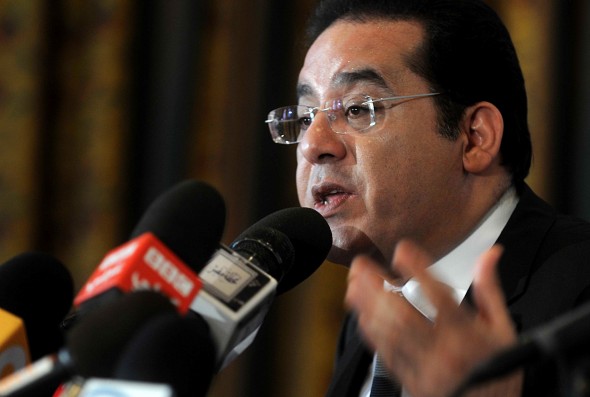
(Photo Presidency Handout)
By Nourhan Dakroury
President Mohamed Morsi launched the Conference for Developmental and Charity Foundations on Wednesday, in which he called for an end to any “negative thoughts and actions” that could cause a threat towards civil society.
Morsi said that the state’s role when it comes to civil society lies in supporting the latter’s causes and removing any restrictions it may face, while at the same time giving it a significant role in dictating political life in Egypt.
He added that the state will fully trust non-governmental organisations (NGOs) in Egypt and will not exercise any form of pressure on them.
Morsi also highlighted that he had presented the NGO draft law to the Shura Council and is waiting for the council to discuss and further develop it.
However, Heba Morayef, director of Human Rights Watch Egypt, said in a tweet that the NGO draft law bans all foreign NGOs from funding local NGOs.
This reflects the concerns of civil society groups like Freedom House and Amnesty International, who said that the draft law would restrict the work of foreign NGOs in Egypt, and would lead to tighter regulations on them.
Other concerns include the government denying certain NGOs licenses under the pretext that they threaten national sovereignty and also prohibiting them from doing research in certain areas.
United Nations High Commissioner for Human Rights Navi Pillay also criticised the law, saying that it would probably cause further deterioration in the scope of civil society in Egypt. Pillay sent the Shura Council comments and suggestions about the law, urging the council to give these comments significant attention.
Hatem Mahmoud Khater, chairman of the General Union for Civil Associations and Institutions, said that NGOs in Egypt are also facing a lack of resources because of the weak economy.
Khater said that since the revolution people have had greater freedom of expression, but not of action.
He added that NGOs should not be kept from accepting foreign aid, explaining that transparency and proper regulation from governmental institutions are what is needed.
Nagwa Khalil, minister of insurance and social affairs, said that many NGOs face difficulties when it comes to proper regulation within the organisation, such as budget plans and monetary issues.
She suggested the formation of courses and workshops to train people who would like to work in this domain in order to help them properly establish and regulate such organisations.
Khalil added that it is very important to focus on solving the difficulties and limitations that NGOs are currently facing.
Khater meanwhile said that one of the most important development issues in Egypt today is that of street children, and stressed the need for a national project to transform these youth from potential criminals into sources of inspiration. He added that if their talents were discovered and properly developed they could have a positive influence on the future of the country.
Morsi said that the issue of street children stands at the top of the list of issues to be addressed by the government, which also includes dealing with people with disabilities and advancing development plans in Sinai and Upper Egypt.

